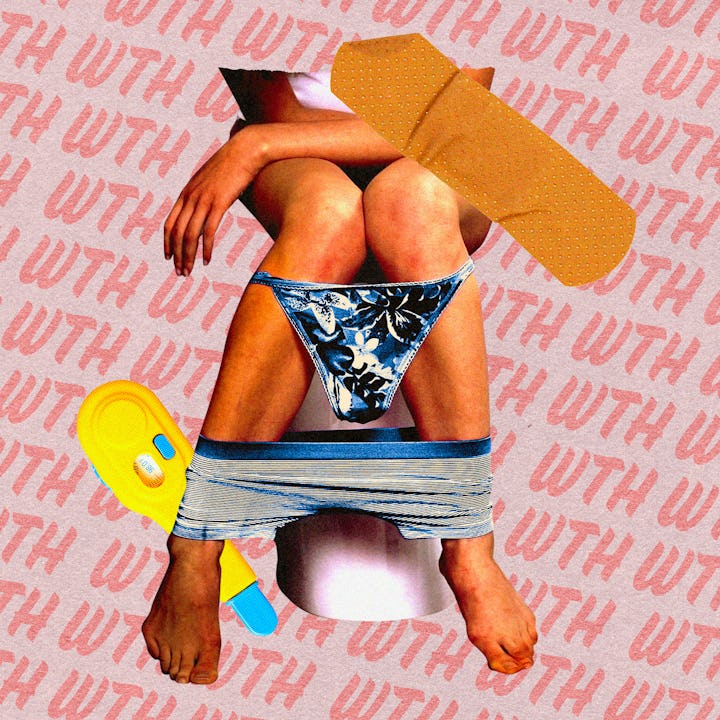What No One Tells You About Peeing After Having Kids
If we talked about this more, it wouldn’t be so unexpected.

WTH?! (What The Health?!) is a Scary Mommy series that will answer health questions relevant to moms and women that we don’t talk about enough. Think: What is this weird pregnancy symptom? WTF is happening to me postpartum? Are these signs of perimenopause? Let’s normalize these and other women’s health issues by talking about them more in a relatable, less clinical, and no-BS way.
“The first few times you run, you will pee yourself — and it will feel like your bladder is falling out.” “Crossing your legs in public when you have to sneeze or cough will be your go-to move.” “Avoid trampolines and bouncy houses at all costs.”
These and other all-too-relatable stories were shared by our readers when we asked what they want other moms to know about peeing postpartum.
Urinary incontinence (the loss of bladder control) and other bladder issues after childbirth are common, yet moms often feel embarrassed to talk about them and don’t have the education they need to deal with them.
“We need to normalize that our body does change [after having a baby], but it's not shameful and there are things you can do about it,” Dr. Kelly Casperson, a urologist and podcaster, tells Scary Mommy.
Here’s what women should know (and often don’t) about peeing after having kids, based on experiences from our readers and advice from a urologist and OB-GYN.
1. Leaking pee while coughing, sneezing, exercising, and other physical activity is actually pretty common.
If you feel like you have to hold in your laughter just to keep your pants dry, you are not alone. About one in three women in their lifetime experience stress incontinence (leaking urine due to pressure on your bladder), Casperson says. Yet this number could be even higher since a lot of women may not bring up the issue to their doctors at all.
2. Urinary incontinence doesn’t just happen with a vaginal birth.
We hate to break the news, but you are not immune from leaking pee if you’ve had a C-section. “The baby traveling through the birth canal does seem to do a little more damage to the pelvic floor. But people with C-sections can have this problem too,” Dr. Casperson explains.
So what can cause this? The baby pushing on the pelvic floor during pregnancy and lower estrogen levels postpartum can lead to these bladder symptoms, says Dr. Erica Montes, an OB-GYN and creator of The Modern Mujer.
3. You may feel a bulge or like you’re “sitting on a tennis ball.”
There is a condition that’s talked about even less than stress incontinence: bladder prolapse, when the bladder bulges into the vaginal wall. “Everybody always says, ‘Nobody told me this could happen,’” Casperson shares.
You may experience anything from mild prolapse (you can see it on an exam but you usually don't feel it) to more severe (the tissue is bulging out of the vaginal opening). “Almost everyone has even mild prolapse after a vaginal delivery because it just happens with carrying the baby, pushing out, and all that pressure,” Montes explains.
Prolapse is a separate issue from stress incontinence, although you may have both of the issues simultaneously (oh joy!).
4. Don’t worry: There are ways you can lower your risk for bladder issues postpartum.
A few tips from Montes:
- From the beginning of pregnancy, stay active and try to maintain a healthy weight for your body type. “The more weight pressure you put on the pelvic floor, that could increase the risk of prolapse and incontinence.”
- In the first few months after delivery, be careful with how much you're lifting. “Let everything heal so there's not more tears in the fascia, the tissue that holds everything up.”
- Go to pelvic floor physical therapy. “Even if you're not having symptoms, it's always good to let them evaluate you and see if there are any exercises they can teach you for prevention.”
5. Thankfully, bladder issues are absolutely treatable.
Several of our readers swore by pelvic floor PT for prevention but also for significantly improving their bladder control after experiencing symptoms. In fact, in France, pelvic floor PT is standard postpartum care and actually paid for by the government. This is not the case in the U.S. yet, so you may need to advocate for yourself to get it, Casperson says.
She adds that in addition to Kegels and other pelvic floor exercises, even doing Pilates and yoga can help women regain their strength after childbirth. If you still need help, see a urologist or urogynecologist.
6. Until you get treatment, try these tips if you’re dealing with daily bladder leakage.
- Go to the bathroom regularly. “Don't wait until [your bladder is] too full because you can leak,” Casperson recommends.
- Wear pads or absorbent underwear, like Thinx. “No one will know, and there’s no shame in it,” one of our readers says.
7. We can normalize these and other postpartum health issues by talking about them more.
Talking to friends openly about how you’re feeling postpartum can help destigmatize some of these health concerns and make you feel less alone. And don’t be afraid to reach out for help if something doesn’t feel right. The sooner you bring it up to the doctor, the sooner you can come up with a treatment plan.
“Society’s expectation that your body doesn't change after having your baby is absolutely ridiculous,” Casperson says. “Your body just was an amazing Ferrari by creating a human. It just needs a little bit of rehab after.”